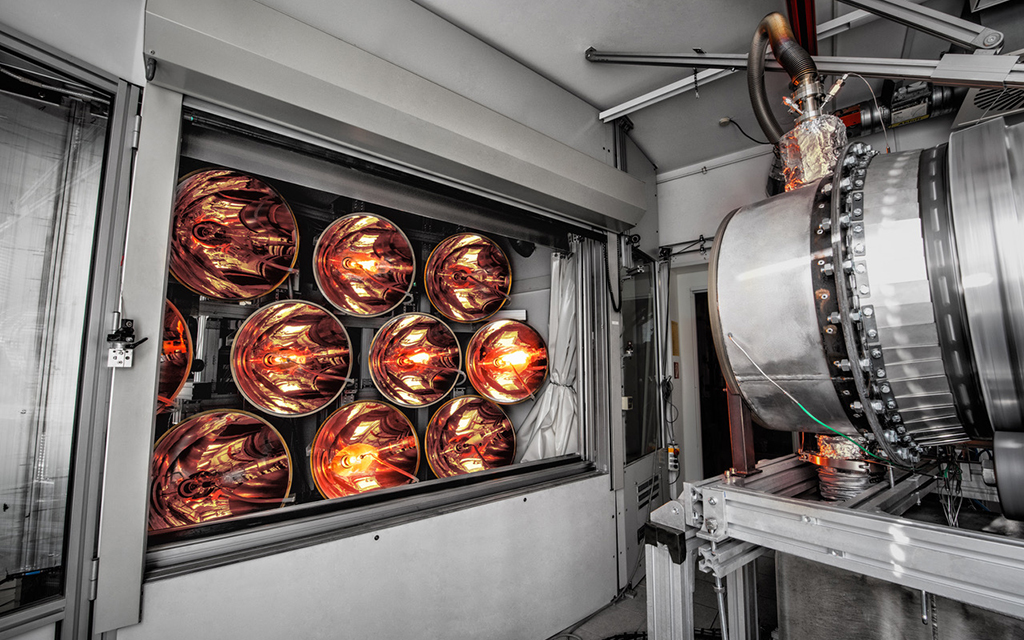The PYSOLO project is a Horizon Europe-funded initiative dedicated to the development of an innovative, fully renewable process that integrates concentrated solar power (CSP) with biomass pyrolysis. This pioneering approach seeks to address the twin challenges of decarbonising and defossilising the European chemical industry by leveraging sustainable energy sources and renewable carbon feedstocks.

Solar heated rotary kiln at the DLR-Solar Simulator in Cologne, Image: DLR
Project Objectives and Significance
The European chemical sector must urgently shift from fossil-based resources to renewable alternatives. While electrification powered by renewables can supply clean energy and heat, it alone is insufficient to meet the European Union’s climate goals and the Paris Agreement targets. A concurrent transition to renewable raw materials—particularly biomass—is essential.
PYSOLO offers a forward-looking solution by integrating CSP technology with biomass pyrolysis. This synergy maximises the yield of high-value products such as bio-oil, biochar, and pyrogas, while substantially reducing associated CO₂ emissions. By replacing combustion-based heating with solar-derived thermal energy, PYSOLO achieves greater efficiency and environmental performance than conventional pyrolysis processes.

This vision closely aligns with the FLEXBY project, as we use a renewable energy powered microwave-assisted pyrolysis process to produce bio-oil, biochar and pyrogas, all of which will be repurposed either as biofuels, catalytic support materials for use within the process itself, or as a fertiliser and soil carbon sequestrator.
This method is a more efficient and sustainable alternative to conventional pyrolysis by offering uniform volumetric heating, faster processing times, and the ability to handle larger feedstock particles. Its compact design, high energy efficiency, and adaptability to various feedstocks contribute to lower emissions and greater scalability.
Concentrated Solar Power (CSP) Technology
At the core of PYSOLO is the application of CSP technology. Movable mirrors (heliostats) concentrate sunlight onto a central solar receiver, where thermal energy is captured by a solid particle heat carrier (PHC). This high-temperature PHC is then used to drive the biomass pyrolysis process.
The project centres on the further development of a rotary kiln particle receiver, optimising its thermal efficiency and stability for continuous operation in heat-intensive applications. This solar-driven heat supply replaces traditional combustion, leading to a cleaner and more sustainable conversion process.
Biomass Pyrolysis Process
Pyrolysis is an endothermic thermochemical process that decomposes biomass—such as wood—into three principal products:
- Bio-oil: a liquid that may serve as a renewable fuel or as a precursor for chemical synthesis.
- Biochar: a carbon-rich solid with applications in agriculture, particularly for soil improvement.
- Pyrogas: a gaseous by-product suitable for energy generation.
Conventional pyrolysis typically involves burning part of the biomass or pyrolysis products to generate the required heat, resulting in reduced yield and higher emissions. In contrast, PYSOLO's use of external CSP-driven heating avoids this inefficiency. By preserving more of the output for productive use, it achieves both higher energy recovery and lower environmental impact.
Implementation Strategy and Technological Development
Launched in July 2023, the four-year PYSOLO project is working to bring two key technological components to Technology Readiness Level (TRL) 4, demonstrating feasibility at laboratory scale:
- Solar Particle Receiver: captures and transfers concentrated solar heat to the PHC.
- Pyrolysis Reactor with Particle-Char Separator: enables continuous pyrolysis and efficient separation of solid by-products.
The system is being designed for flexibility and scalability, including features such as thermal energy storage and alternative heating options to allow continuous operation irrespective of solar availability.
Consortium and Collaborative Framework
The PYSOLO consortium comprises nine partners across four European countries, uniting expertise in CSP, pyrolysis technologies, materials science, and system engineering. This multidisciplinary partnership ensures a comprehensive approach to both research and innovation.
Moreover, PYSOLO actively participates in a Horizon Europe project community that includes other initiatives that focus on the development of Concentrated Solar Power. Through joint stakeholder engagement, knowledge exchange, and coordinated dissemination, the projects foster a collaborative ecosystem that enhances impact and accelerates technological uptake across sectors.
Conclusion
The PYSOLO project represents a decisive advancement in the pursuit of a climate-neutral Europe. By combining concentrated solar power with biomass pyrolysis, it offers a scalable and sustainable pathway to low-emission, bio-based chemical and energy production.
Together with FLEXBY, it illustrates how technological synergy and cross-sectoral innovation can transform renewable resources into viable alternatives to fossil fuels—strengthening Europe’s leadership in clean energy and circular economy solutions.
Learn more about the project.